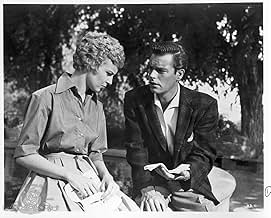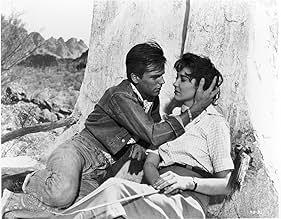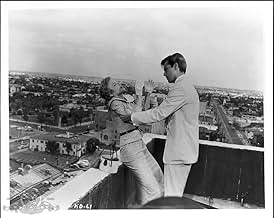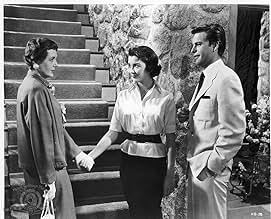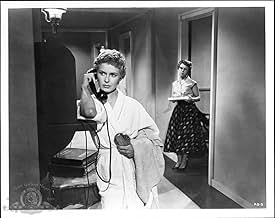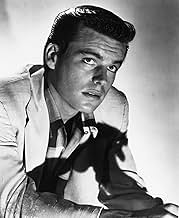CALIFICACIÓN DE IMDb
6.7/10
4.7 k
TU CALIFICACIÓN
Un estudiante universitario despiadado recurre al asesinato en un intento de casarse con una heredera.Un estudiante universitario despiadado recurre al asesinato en un intento de casarse con una heredera.Un estudiante universitario despiadado recurre al asesinato en un intento de casarse con una heredera.
- Dirección
- Guionistas
- Elenco
Albert Cavens
- Restaurant Patron
- (sin créditos)
Robert Ivers
- Student at Murder Scene
- (sin créditos)
Mickey Martin
- Student
- (sin créditos)
Joe McGuinn
- Chemistry Professor
- (sin créditos)
Edwin Rochelle
- Restaurant Patron
- (sin créditos)
Jack Stoney
- Policeman
- (sin créditos)
- Dirección
- Guionistas
- Todo el elenco y el equipo
- Producción, taquilla y más en IMDbPro
Opiniones destacadas
This Cinemascope Technicolor murder drama from 1955 is a great looking film with perfect 50s visuals to carry it well in 2008. In retrospect, I can see the source for both PEEPING TOM and PSYCHO both in 1960 offering the 'shocking' image of a square cut handsome young man as a cruel killer. Of course that idea alone is really a flip on MONSIEUR VERDOUX with Chaplin as the ageing dandy/ dapper killer and even the comedy ARSENIC AND OLD LACE again with the least suspecting type as killers. This version of KISS now-days is reflected in MR RIPLEY too. While it is not up the caliber of that film either, these films all form a group of murder mysteries depicting unassuming types revealed to be murderers. A KISS BEFORE DYING has the very handsome Robert Wagner and equally good looking Jeffrey Hunter pitched front and center for what must have been wild female audience reaction. One scene late in the film set in the desert features Wagner in the tightest jeans imaginable looking like a gay denim version of James Dean. It is all a bit silly in its storyline (university campus killer and rich girl family dramas) but visually it is a real 50s treat. Remade clumsily as a Matt Dillon thriller in 1991, this really is the better version completely because of the great looking cast (incl Joanne Woodward and Mary Astor) and the immensely enjoyable Cinemascope 50s set design and art direction.
An evil young man resorts to murder in his efforts to get his hands on an heiress's fortune. Unluckily for him, the heiress's sister and a smart young college lecturer smell a rat ...
This is a sumptuous mid-50's all-American movie, set in a world of sorority houses, open-top cars and drug stores. The boys have shiny, well-oiled hair and the girls wear big skirts. Courting couples meet on the bleachers at the football field between classes.
Shot in cinemascope, the film's aspect ratio means that television (where I saw it) does it a disservice: all too often, dialogues are conducted between two noses at either extreme of the screen. The colour is 'de luxe', so the credits tell us, and indeed the look of the film is rich and bright.
The film is a standard thriller, based on an Ira Levin novel. It is well put together, and has a nice, slinky jazz score, including the theme song (playing on the juke box during one of Bud's dates with Dory).
The opening is impressive. The camera pans around a student's bedroom, neatly setting the scene for us. We hear (but do not see) a girl crying. Gradually, as the characters are revealed, we get the message - Dory has found out that she is pregnant by Bud. She has a wealthy father, but is prepared to forego comfort if the man she loves will marry her. Bud is much more interested in the family money.
Even though Bud is despicable, we find ourselves wanting his scheme to succeed, so cleverly are we drawn into his plan. He surreptitiously studies poisons in the university library, then by a cunning ploy gains access to the chemistry lab. He composes a note in Spanish, ostensibly a piece he needs to translate for his class, then gets Dory to write out the English for him. She doesn't realise it, but she is writing her own 'suicide note'. Gerd Oswald's direction is strong on body language throughout the movie, and we cannot help but see the significance when Dory (played by Joanne Woodward) goes to kiss Bud, and he flinches.
A very young Robert Wagner portrays Bud as a slick, incredibly handsome villain with no feelings. He feigns affection for women, but is capable of none. When he cajoles his mother (Mary Astor) into choosing a tie for him, he craftily changes it for a preferred one when her back is turned.
The director is adept at conveying information without words. When Bud looks at the municipal building and marvels at its height, we know straight away what he is planning. When he is on the roof, the tension is sustained commendably.
Victoria Leith plays Ellen, Dory's sister. In another fine 'body language' moment, we see her subtly shrugging off her father's attempt to comfort her. We gather from this that Ellen blames him for what happened to Dory.
The plot contains some elements which stretch our credulity. If the ending is contrived and highly improbable, at least the incremental steps by which doubt invades Ellen's awareness are cleverly done.
Is it a coincidence that Jeff Hunter (Gordon Grant) and Robert Wagner look so alike? Or are they meant to represent two facets of intelligence - one cold and selfish, the other beneficent and altruistic? In the scene just before the engagement party, they are even dressed identically.
Verdict - A cleverly-executed murder flick.
This is a sumptuous mid-50's all-American movie, set in a world of sorority houses, open-top cars and drug stores. The boys have shiny, well-oiled hair and the girls wear big skirts. Courting couples meet on the bleachers at the football field between classes.
Shot in cinemascope, the film's aspect ratio means that television (where I saw it) does it a disservice: all too often, dialogues are conducted between two noses at either extreme of the screen. The colour is 'de luxe', so the credits tell us, and indeed the look of the film is rich and bright.
The film is a standard thriller, based on an Ira Levin novel. It is well put together, and has a nice, slinky jazz score, including the theme song (playing on the juke box during one of Bud's dates with Dory).
The opening is impressive. The camera pans around a student's bedroom, neatly setting the scene for us. We hear (but do not see) a girl crying. Gradually, as the characters are revealed, we get the message - Dory has found out that she is pregnant by Bud. She has a wealthy father, but is prepared to forego comfort if the man she loves will marry her. Bud is much more interested in the family money.
Even though Bud is despicable, we find ourselves wanting his scheme to succeed, so cleverly are we drawn into his plan. He surreptitiously studies poisons in the university library, then by a cunning ploy gains access to the chemistry lab. He composes a note in Spanish, ostensibly a piece he needs to translate for his class, then gets Dory to write out the English for him. She doesn't realise it, but she is writing her own 'suicide note'. Gerd Oswald's direction is strong on body language throughout the movie, and we cannot help but see the significance when Dory (played by Joanne Woodward) goes to kiss Bud, and he flinches.
A very young Robert Wagner portrays Bud as a slick, incredibly handsome villain with no feelings. He feigns affection for women, but is capable of none. When he cajoles his mother (Mary Astor) into choosing a tie for him, he craftily changes it for a preferred one when her back is turned.
The director is adept at conveying information without words. When Bud looks at the municipal building and marvels at its height, we know straight away what he is planning. When he is on the roof, the tension is sustained commendably.
Victoria Leith plays Ellen, Dory's sister. In another fine 'body language' moment, we see her subtly shrugging off her father's attempt to comfort her. We gather from this that Ellen blames him for what happened to Dory.
The plot contains some elements which stretch our credulity. If the ending is contrived and highly improbable, at least the incremental steps by which doubt invades Ellen's awareness are cleverly done.
Is it a coincidence that Jeff Hunter (Gordon Grant) and Robert Wagner look so alike? Or are they meant to represent two facets of intelligence - one cold and selfish, the other beneficent and altruistic? In the scene just before the engagement party, they are even dressed identically.
Verdict - A cleverly-executed murder flick.
A scheming college guy, played by a youthful Robert Wagner, tries to marry into wealth. Complications result in murder. Because of the murder angle, and because the plot centers on Wagner's sly and cunning character, the film reminds me a little of "Dial M For Murder". But, to its credit, "A Kiss Before Dying" has a darker, more brooding, noir-like quality, helped along by a 50's music score that is jazzy and slightly mournful.
Wagner's acting, if not Oscar-worthy, is at least acceptable. But Jeffrey Hunter is miscast, and therefore not convincing, as the pipe-smoking professor/detective. And Joanne Woodward gives a clinging, and altogether too whiny, performance, as the damsel in distress. A couple of interesting, if somewhat implausible, plot twists add impact to the screenplay. The film's conclusion, however, is predictable and just a tad melodramatic.
Overall, "A Kiss Before Dying" comes across as a stylish, very 1950ish, wanna-be classic. It doesn't quite succeed, but is nonetheless worth watching at least once, especially for viewers who like dark, brooding, twist-laden thrillers.
Wagner's acting, if not Oscar-worthy, is at least acceptable. But Jeffrey Hunter is miscast, and therefore not convincing, as the pipe-smoking professor/detective. And Joanne Woodward gives a clinging, and altogether too whiny, performance, as the damsel in distress. A couple of interesting, if somewhat implausible, plot twists add impact to the screenplay. The film's conclusion, however, is predictable and just a tad melodramatic.
Overall, "A Kiss Before Dying" comes across as a stylish, very 1950ish, wanna-be classic. It doesn't quite succeed, but is nonetheless worth watching at least once, especially for viewers who like dark, brooding, twist-laden thrillers.
I read Ira Levin's book when I was young, sometime in the 1960s, and loved it. It's very chilling, and I think as good as Rosemary's Baby. Better than the Stepford Wives and Boys from Brazil.
This film is a quite bizarre mixture of the chilling and the comical. Someone above has mentioned the scene where Bud and Dorie are having an intense conversation when suddenly a middle-aged woman in a completely see-through blouse with a great big bra underneath walks between them and halts the conversation; she has nothing whatsoever to do with the plot, and when it happened I literally burst out laughing at the incongruousness of it. I also laughed at Jeffrey Hunter's ridiculous attempts to manipulate heavy Clark Kent spectacles and an unlit pipe in a vain attempt to appear mature.
The good points about the film are the plot, which is gripping even though it's been shortened markedly from the book, and some of the acting, particularly Robert Wagner and Joanne Woodward -- and I also enjoyed George Macready as the father of Dorie and Ellen.
The fact is that I was consistently interested or amused or gripped by something or other for the whole of the film. You can't really ask for much more from a film.
This film is a quite bizarre mixture of the chilling and the comical. Someone above has mentioned the scene where Bud and Dorie are having an intense conversation when suddenly a middle-aged woman in a completely see-through blouse with a great big bra underneath walks between them and halts the conversation; she has nothing whatsoever to do with the plot, and when it happened I literally burst out laughing at the incongruousness of it. I also laughed at Jeffrey Hunter's ridiculous attempts to manipulate heavy Clark Kent spectacles and an unlit pipe in a vain attempt to appear mature.
The good points about the film are the plot, which is gripping even though it's been shortened markedly from the book, and some of the acting, particularly Robert Wagner and Joanne Woodward -- and I also enjoyed George Macready as the father of Dorie and Ellen.
The fact is that I was consistently interested or amused or gripped by something or other for the whole of the film. You can't really ask for much more from a film.
Oh, how to resolve the age-old problem of accidentally getting your girlfriend preggers? Well, if you're a good-looking, psychopathic college boy, as portrayed by Robert Wagner in the 1956 thriller "A Kiss Before Dying," the answer is fairly simple: Just knock her off and hope for the best...and pray that her snoopy sister won't start nosing around! Anyway, that's the setup for what turns out to be in essence a poor man's "A Place in the Sun" (1951), but nevertheless a film that remains quite entertaining in its own right. Based on an Ira Levin novel, directed by cult favorite Gerd Oswald, and featuring beautiful, wide-screen color filming (shown to good advantage on the DVD that I just watched), the film certainly does impress. Joanne Woodward comes off very sympathetically here in her third film, and supporting players Mary Astor (a 50-year-old redhead in this picture), George Macready (less hissable than usual) and Jeffrey Hunter (who will ALWAYS be Capt. Pike to me!) are all very fine. But Wagner certainly does steal the show as the pretty-boy whacko. Storywise, I'd say that the plot is a wee bit on the far-fetched side, but never absurdly so, and that most viewers will easily foresee how Wagner will slip up in the end. Still, the film remains suspenseful throughout and concludes most satisfactorily. Strange that the "abortion" word is never brought up, though. Could Wagner's character be a pro-lifer who's into murder? He wouldn't be the first!
¿Sabías que…?
- TriviaThe producers had to fight the Production Code office, or what was left of it by this time, to get the word "pregnant" into the film. Even then, the word was deleted in some parts of the country by local censors. The novel was further bowdlerized by having no discussion in the film between Bud and Dorothy about the possibility of her having an abortion, and the pills Bud gives her are said by him to be vitamins and are in fact simply poison to kill her - whereas in the novel they are intended to induce a termination of pregnancy.
- ErroresNear the end, Gordon is riding to the mine in a Cadillac limousine that has air conditioning, as indicated by small air scoops on both sides behind the back doors. The next shots (after the accident) show a different Cadillac without them. Cars of this era with factory installed air conditioning had half of the system in the trunk, requiring outside air via those little air scoops.
- Citas
Bud Corliss: It's not right.
Dorothy Kingship: What?
Bud Corliss: For anyone to love somebody as much as I love you.
- ConexionesReferenced in Living Single: A Kiss Before Lying (1993)
Selecciones populares
Inicia sesión para calificar y agrega a la lista de videos para obtener recomendaciones personalizadas
Detalles
- Tiempo de ejecución1 hora 34 minutos
- Color
- Relación de aspecto
- 2.35 : 1
Contribuir a esta página
Sugiere una edición o agrega el contenido que falta

Principales brechas de datos
What is the French language plot outline for Un beso antes de morir (1956)?
Responda

